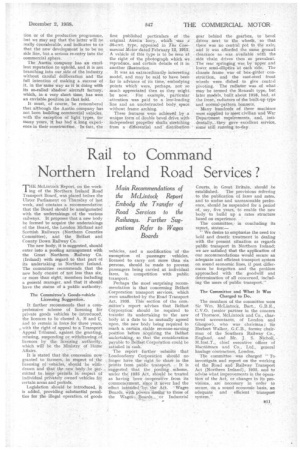Rail to Command Northern Ireland Road Services ?
Page 45

If you've noticed an error in this article please click here to report it so we can fix it.
THE McLintock Report, on the working of the Northern Ireland Road Transport Board, was placed before the Ulster. Parliament on Thursday of last week, and contains a recommendation that the Board should be amalgamated with the undertakings of the various railways. It proposes that a new body be formed to acquire the undertakings of the Board, the London Midland and Scottish Railways (Northern Counties Committee), and the Belfast and County Down Railway Co.
The new body, it is suggested, should enter into a pooling arrangement with the Great Northern Railway Co. (Ireland) with regard to that part of its undertaking in Northern Ireland. The committee recommends that the new body consist of 'not less than six, or more than eight, members including a general manager, and that it should have the status of a public authority.
The Committee's ,Goods-vehicle Licensing Suggestion.
It further recommends that a comprehensive scheme of licensing 'ROr private goods vehicles be introduced, the licences to be classed A, B and C, and to remain in force for three yearS, with the right of appeal to a Transport Appeal Tribunal, against the granting, refusing, suspending or withdrawing of licences by the licensing authority, which will be the Ministry of Home
Affairs. • .
It is stated that the concession now granted to farmers; in respect 'of the licensing of vehicles, should ' be withdrawn and that the new body ,be permitted to issue -permits in respect of individual privately owned vehicles for certain areas and periods.
Legislation should be introduced, it is added, providing substantial penaities for the illegal operation of goods vehicles, and a modification of the exemption of passenger vehicles, licensed to carry not more than six persons, should be made to prevent passengers being carded at individual fares, in competition with public transport.
Perhaps the most surprising recommendation is that concerning Belfast -Corporation transport services, which were unaffected by the Road Transport Act, 1935. This section of the committee's report advises that Belfast Corporation should be required to transfer its undertaking to the new body at a date to he mutually agreed upon, the new body being required to reach a certain stable revenue-earning position before acquiring the Belfast undertaking, so that the consideration payable to Belfast Corporation could be satisfied in cash.
The report further submits that Londonderry Corporation should no longer have the right to share in the profits from public transport. It is suggested that the pooling scheme, under the 1935 Act, should be treated as having been -inoperative from its commencement, since it riever had the
effect intended by the Adt. Wages Boards, with pOwers airisrilar,, -to those of the WageSa-, Boards, -or Industrial
Courts, in Great Britain, should be established. The provisions feferring to the publication of fares and rates, and to undue and unreasonable preference, should be suspended for a period of, say, five years, to enable the new body to build up a rates structure based on experience.
The committee,' in concluding its report, states:— " We desire to emphasize the need for bold and drastic treatment in dealing with the' present situation as regards public transport in Northern Ireland; we are satisfied that the application of our recommendations would secure an adequate and efficient transport system
on sound economic lines, past differences be forgotten and the problem approached with the' goodwill and determination of all concerned, including the users of public transport.
The Committee and What It Was Charged to Do.
The members of the committee were Sir Win. McLintock, Bart., G.B.E., C.V,O. (senior partner in the Concern of Thomson, McLintock and Co., chartered accountants, of London and ,Glasgow), who was chairman ; Sir Herbert Walker, G.C.B., former chair-' man of the Southern Railway Co„ England, and Mr. J. S. Nicholl, M.Inst.T., chief executive officer of Macnainara and Co., Ltd., general haulage'cOntractors, London.
The committee was charged " Toinvestigate and report on the working of the Road and ' Railway Transport Act (Northern Ireland), 1935, and to advise What improvements in the operation' of the Act, or changes 'in its provisiOns, . ate necessary in order to sectire, On a sound economic basis, an adequate • and efficient transport system."




























































































